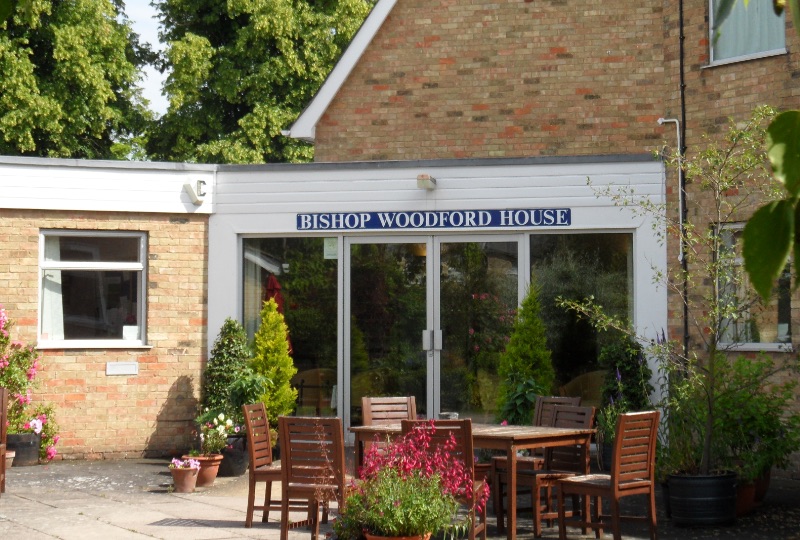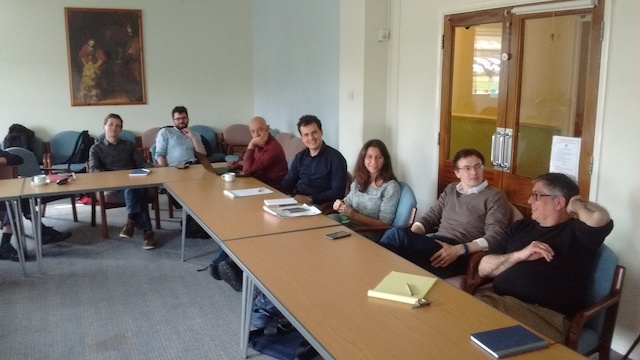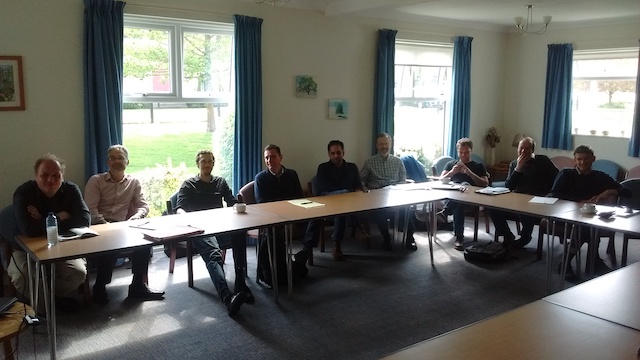New Thoughts 3: About the Universe and More
Wednesday 19th - Thursday 20th April 2017
Bishop Woodford House, Ely, UK
 Bishop Woodford House
Bishop Woodford House
 Poet's House Restaurant
Poet's House Restaurant
Supported by a mini-grant from the Foundational Questions Institute.
Participants:

- Feraz Azhar (Wed only; No seafood; aubergine and beef)
- Jonathan Braden (Stay over; Terrine and Beef; tour)
- Jeremy Butterfield (Vegetarian; Aubergine and Mushroom)
- Julien Carron (Stay over; Terrine and Beef)
- Anthony Challinor (Wed only; meal)
- George Efstathiou (Stay over, ground floor room; Aubergine and Beef)
- Job Feldbrugge (Aubergine and Mushroom; tour)
- Steven Gratton (Stay over; Aubergine and Beef; tour)
- Will Handley (Terrine and Beef)
- Adrian Kent (Wed only; vegetarian; Aubergine and Mushroom)
- Antony Lewis (Stay over; Aubergine and beef)
- Jonathan Oppenheim (Stay over; vegetarian; aubergine and mushroom)
- Andrew Pontzen (Stay over; no shellfish; Aubergine and Beef)
- Paul Saffin (Stay over; terrine and beef)
- Laura Sberna (Vegetarian; Aubergine and Mushroom; tour)
- Andrew Tolley (Tour)
- David Tong (Terrine and Beef)
- Vincent Vennin (Stay over; Aubergine and beef)

Programme (subject to change):
Wednesday 19th April
- 10am-11am: Arrive with Morning Coffee from 10:15am
- 11am-1pm:
- Introductions and part-baked ideas
- Should one consider Multiverses? (GPE/DT)
- Or Many-worlds? (AK)
- Or firewalls? (JO)
- 1pm-2pm: Lunch
- 2pm-3:30pm:
- What do moments of the density field miss? (JC)
- Galaxy properties from Information Theory (AP)
- 3:30pm-4pm: Afternoon Tea
- 4pm-6:30pm:
- Are CMB fluctuations definitely Quantum? (VV)
- Picard-Lefschetz theory for Quantum Cosmology (JF)
- 7:30pm: Dinner at Poet's House Restaurant
Thursday 20th April
- 8:30am: Breakfast for those staying over
- 9:30am-10:45am:
- What is the lowest tensor-to-scalar ratio one can in principle measure? (AL)
- Thermodynamics and Gravity (JO)
- 10:45am-11:15am: Morning Coffee
- 11:15am-1pm:
- Quantum Tunnelling via Picard-Lefschetz theory (LS)
- Modelling false vacuum bubble nucleation (JB)
- 1pm-2pm: Lunch
- 2pm-3:30pm:
- How to integrate oscillatory ODEs quickly (WH)
- What is the gauge group of the standard model? (DT)
- How to do inference when you don't really know what you're doing (SG)
- 3:30pm-4pm: Afternoon Tea
- 4pm: Meeting finishes -- depart/Cathedral visit
Practical Details
The mini-grant should cover tea/coffee, lunches, evening meal and accommodation for those who need it. If there is any money left over it might be possible to help some people out with travel expenses too.
If there is sufficient interest we might take in a short tour of Ely Cathedral
as a social event at some point.
Dinner Menu
Please let me know your choice of starter and main course:
- Pressed ham hock terrine with spiced cabbage and apple chutney
- Aubergine and tomato charlotte, parmesan and rocket pesto
- Slow cooked beef blade, watercress, fondant potato, heritage carrots and cauliflower
- Portobello mushroom, garlic and thyme wellington, truffle hollandaise
- Toffee pudding, vanilla ice cream
Potential Topics and Preparatory Material:
Thanks for your suggestions listed below. We'll mould
this into something resembling a programme as the meeting
approaches...
Approximating the collisionless Boltzmann equation
beyond the Jeans' Equations (Pontzen)
Picard-Lefschetz Theory for Quantum Cosmology (Feldbrugge)
Analogue condensed matter systems for false vacuum bubble nucleation (Braden)
Can we prove that CMB fluctuations have a quantum origin? (Vennin)
Dark matter halo profiles and statistical measures (Carron)
In a cosmological N-body box the two-body relaxation timescale is so huge that for any practical purpose the correct description of the system
is the corresponding Vlasov-Poisson system, of which halos must form stationary solutions.
Attempts to setup a statistical ensemble based on particle-based forms of entropy cannot recover these solutions,
as the two limits 'N' and 'time' go to infinity do not commute. Is it possible to understand instead the statistical mechanics of the Vlasov-Poisson system ?
Non-linear transformations of the matter density field (Carron)
Non linear transforms have been proposed for quite a while now as a way to recapture information lost by non-linear evolution.
How useful can they really be for cosmology and what can they really teach us about the density field ?
Thermodynamics and Gravity (Oppenheim)
Realist one-world versions of quantum theory (Kent)
Generalizations of quantum theory (Kent)
Does physics have anything to say about consciousness? (Kent)
Can lab experiments or astronomical observations rule out the string
landscape? (Marsh)
There is now compelling, but still largely indirect, evidence for the existence of a vast landscape of metastable de Sitter vacua from compactifications of string theory. Current estimates from some of the better understood constructions suggests that the number of such vacua is very large but finite, roughly of the order of 10^(272,000). Hence, these solutions appear sufficiently numerous to account for the smallness of the observed vacuum energy. Whether this framework can be falsified has been hotly debated over the past decade, but not uncommonly without input from either quantum field theory or string theory. I suggest discussing how laboratory experiments or astronomical observations can, at least in principle, rule out the string landscape, as presently understood.
Can quantum-inspired reasoning be useful in everyday life? (Gratton)
I've been thinking about the applicability of the formalism of quantum mechanics to everyday life. It seems to be directly relevant for situations in which the very act
of coming to a conclusion or decision on one issue affects one’s confidence about
conclusions or decisions on another issue.
Faster cosmology with Runge-Kutta-WKB (Handley)
What is the smallest primordial tensor mode that in principle could be
detectable in the CMB? (Lewis)
 Bishop Woodford House
Bishop Woodford House
 Poet's House Restaurant
Poet's House Restaurant

